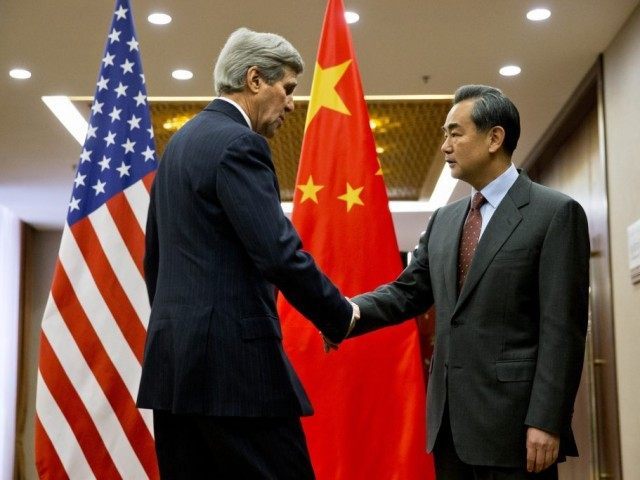Chinese Foreign Minister Wang Yi will be in the United States from Tuesday to Thursday, meeting with his counterpart, Secretary of State John Kerry, and other high-level officials on everything from North Korea’s growing belligerence to China’s own provocations in the South China Sea.
In anticipation of that meeting, the Chinese Foreign Ministry and Chinese state propaganda have escalated their calls for the United States to cease freedom of navigation operations in the South China Sea, intended to challenge Beijing’s usurpation of territory considered international waters and disputed by five other nations.
“China and the U.S. are expected to exchange views on the Korean Peninsula nuclear issue during Wang’s visit,” Chinese Foreign Ministry spokeswoman Hua Chunying said on Monday. She did not confirm whether the South China Sea territorial dispute will arise, instead reiterating China’s stance on the issue: most of the South China Sea belongs to China, and the United States has no role to play in preventing China from constructing military facilities on territory that belongs to other countries.
“The U.S. side is misusing the concept [of militarization],” she told reporters. “The deployment of defense facilities on China’s own territory is no different from what U.S. does in Hawaii.” Hua argued that the United States sees the South China Sea dispute as a “pretext to make a fuss.” “The U.S. is not involved in the South China Sea dispute,” she added decisively.
China claims most of the South China Sea, specifying where it believes China’s control ends on a map using what is now popularly known as the “nine-dash line”:

China has begun building artificial islands and facilities in the disputed island ranges, particularly the Spratly and Paracel Islands. Most recently, China placed an advanced surface-to-air missile system on an artificial island in the Paracels, prompting international alarm. Vietnam, which claims the Paracel Islands, has responded to such moves by increasing its purchases of military equipment significantly over the past year. “It’s obvious and necessary for Vietnam to invest in new military equipment, especially after the South China Sea has become a hot spot,” said Tran Cong Truc, former chief of the government’s border committee,” told the Wall Street Journal Monday.
The Philippines, Brunei, Malaysia, Taiwan, and Vietnam all contest the nine-dash line at different points, and the Philippines has brought the case to the Permanent Court of Arbitration at The Hague. The United States has also challenged the nine-dash line through two “freedom of navigation” exercises, in which U.S. Navy ships passed through the alleged Chinese territory to assert its status as international waters.
In response to criticism that Beijing is weaponizing the territory it has taken from other countries, it has condemned the presence of American Navy vessels in the region. America’s presence in the region, Foreign Ministry spokesman Hong Lei said on Saturday, has “escalated tensions in the South China Sea, and that’s the real militarization of the South China Sea.”
The Foreign Ministry typically makes more measured statements than those published in state-owned media. The propaganda newspaper Global Times published an editorial Monday, for example, echoing Hong’s remarks with much more elevated language. “The US is the initiator of militarizing the South China Sea and many international political tragedies are the consequences of an action-reaction spiral,” the column alleges, claiming that the United States has “set aside its responsibility to safeguard world peace and painstakingly dealt with possible challenges brought by China’s emergence” to “protect its hegemony.”
American military officials have made clear they have no intention of ceasing freedom of navigation operations in the region and have begun encouraging other nations to do the same. “We haven’t changed what we’re doing, we’re pretty much doing what we’ve done for decades and decades; ensuring that these sea lines of communication remain open,” the Commander of the US Seventh Fleet, Vice Admiral Joseph P. Aucoin, said in remarks while visiting Australia this week. He added that it would be in the “best interests” of the region if Australia engaged in some similar operations, as well. “This shouldn’t seem provocative,” he added.

COMMENTS
Please let us know if you're having issues with commenting.